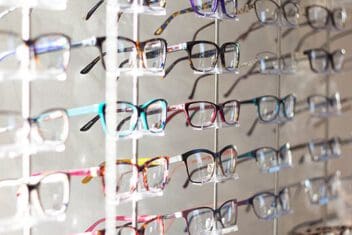Common Visual Side Effects From Birth Control
Home / Vision Education Center / Vision Issues During Pregnancy /
Last Updated:
Table of Contents
Hormonal birth control can cause a wide range of symptoms, including effects on your vision. Dry, irritated, and watery eyes are some of the most common visual side effects.
Approximately 1 in 230,000 women experience visual side effects of birth control. Theses side effects range in severity from dry eye and blurry vision to intraocular hemorrhage and optic neuropathy.
If you experience visual symptoms caused by your birth control, there are things you can do to alleviate them. Approaches include using lubricating eye drops, reducing eye strain, and even changing your birth control.
For most women, visual symptoms of birth control go away once the body’s hormone levels return to normal. This can happen once the body adjusts to a new birth control or when you stop taking hormonal contraceptives.
Can Birth Control Affect Your Vision?

Hormonal birth control, such as oral contraceptives, can impact your vision. An imbalance in hormone levels, no matter the cause, can cause vision problems. Hormones are responsible for regulating many important bodily functions, many of which impact the eyes. When these functions change, your vision can change too.
Hormonal changes caused by pregnancy, age, or certain medications, including birth control, can cause uncomfortable effects on your eyes. Dry, irritated, and watery eyes are some of the most common visual effects of birth control, though symptoms range in severity.
You deserve clear vision. We can help.
With 135+ locations and over 2.5 million procedures performed, our board-certified eye surgeons deliver results you can trust. Your journey to better vision starts here.
How Common Are Visual Side Effects of Birth Control?
Visual side effects of hormonal birth control are estimated to affect about 1 in 230,000 women. Millions of women around the world take hormonal birth control for a variety of reasons.
In addition to preventing unwanted pregnancy, women experiencing the following conditions use birth control as a treatment method:
- Menorrhagia
- Endometriosis
- Acne
- Hirsutism
- Fibroid uterus and premenstrual syndrome
For a small percentage of women with the above conditions, as well as women taking birth control for traditional reasons, visual side effects are experienced. Changes in hormone levels that affect vision can be natural and are not necessarily cause for concern. Understanding potential side effects can help you respond appropriately to any visual side effects you observe.
Side Effects of Birth Control on Your Vision

Scientists have identified a range of both beneficial and negative visual side effects that oral contraceptives can have on women. Some side effects are relatively mild and easily addressed, while others require medical treatment.
Negative visual side effects of birth control include the following:
- Dry eye
- Corneal disturbances
- Eye inflammation
- Lens opacities
- Blurry vision
- Retinal neuro-ophthalmologic or vascular complications
- Discomfort on the ocular surface
- Contact lenses becoming uncomfortable to wear
- Thrombosis of cerebral or retinal vessels
- Intraocular hemorrhage
- Aneurism
- Macular or papillary edema
- Optic neuropathy
The potential side effects of birth control on your vision vary significantly. In addition to the above negative side effects, positive changes can occur, such as these:
- Reduction of symptoms of keratoconjunctivitis in postmenopausal women
- Prevention of cataracts
- Treatment of neurodegenerative eye diseases
- Treatment of diabetic and oxygen-induced retinopathy
- Reduction of severity of menstrual symptoms
- Treatment of acne
Experts from the American Academy of Ophthalmology (AAO) explain that estrogen and progesterone have a lot to do with the ocular impacts of hormonal changes in women. Changes in the levels of these hormones can affect the eyes’ oil glands and the elasticity of the cornea, both of which lead to unpleasant visual symptoms.
You deserve clear vision. We can help.
With 135+ locations and over 2.5 million procedures performed, our board-certified eye surgeons deliver results you can trust. Your journey to better vision starts here.
How to Address Visual Symptoms

Scientists who recently published a study in the International Journal of Ophthalmology suggest that a change to combined oral contraceptives could reduce the risk of serious visual side effects of birth control. The study recommends eliminating the estrogen dosage in oral contraceptives and instead selecting a third-generation progestin.
Speak with your doctor about changing your birth control prescription in order to address visual symptoms. Dry eye is one of the leading vision symptoms of birth control, so it’s important to know how to treat it at home.
Here are some tips for alleviating dry eye:
- Do your best to keep your eyes clean.
- Take frequent breaks to rest your eyes when doing work on a screen.
- Put your computer screen at an eye level that does not strain your eyes.
- Use a humidifier inside to prevent air from getting too dry.
- Give your eyes time to rest by getting enough sleep.
- Take a break from wearing contact lenses by switching to glasses.
- Do not smoke.
- Do not drink too much alcohol.
- Avoid prolonged amounts of time in air-conditioned or heated rooms.
- Avoid spending time in smoky, dusty, or dry places.
In addition to taking the above steps to alleviate dry eye, you may speak with your eye doctor if your symptoms do not improve or your vision gets worse. Your eye doctor may prescribe additional eye drops, ointments, or gels to get you some relief.
Vision After Birth Control
AAO explains that vision symptoms tend to resolve themselves as hormone levels even out. This can occur as your body adapts to additional hormones you get from birth control and when you stop taking birth control.
It may take some time, but hormone levels and your vision should adjust after a couple months. If vision symptoms do not go away, or they suddenly change or get worse, you should see an ophthalmologist right away. Sudden vision changes can indicate the presence of more serious eye problems, such as those caused by diabetes.
You deserve clear vision. We can help.
With 135+ locations and over 2.5 million procedures performed, our board-certified eye surgeons deliver results you can trust. Your journey to better vision starts here.
References
- Do Hormones Affect Vision? Vision Service Plan.
- Dry Eyes. (December 2018). National Health Service UK.
- How Hormones Can Affect Eyes and Vision. (October 2018). American Academy of Ophthalmology.
- The Impact of Combined Oral Contraceptives on Ocular Tissues: A Review of Ocular Effects. (October 2017). International Journal of Ophthalmology.
This content is for informational purposes only. It may have been reviewed by a licensed physician, but is not intended to serve as a substitute for professional medical advice. Always consult your healthcare provider with any health concerns. For more, read our Privacy Policy and Editorial Policy.